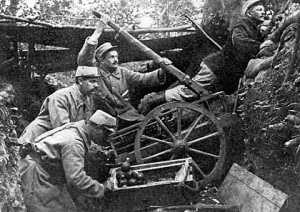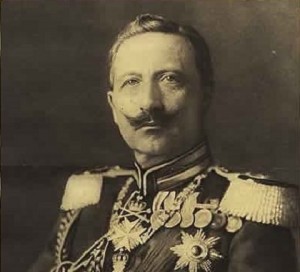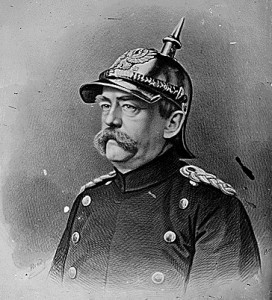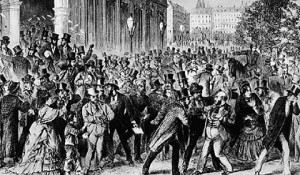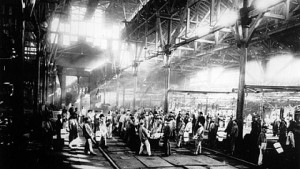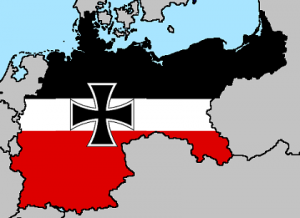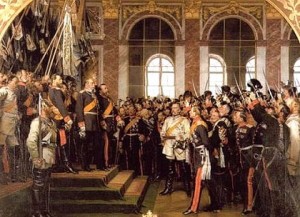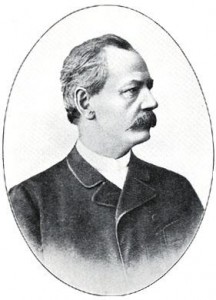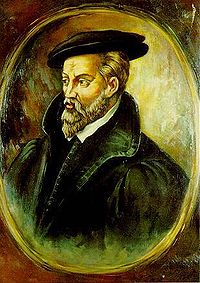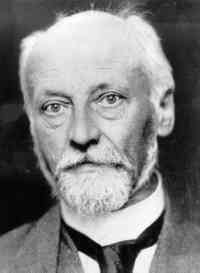Germany's leadership had hoped for a limited war between Austria-Hungary and Serbia. But because Russian forces had been mobilized in support of Serbia, the German leadership made the decision to support its ally. The Schlieffen Plan, based on the assumption that Germany would face a two-front war because of a French-Russian alliance, required a … [Read more...]
Foreign Policy in the Wilhelmine Era
Foreign policy in the Wilhelmine Era (1890-1914) turned away from Bismarck's cautious diplomacy of the 1871-90 period. It was also marked by a shrill aggressiveness. Brusque, clumsy diplomacy was backed by increased armaments production, most notably the creation of a large fleet of battleships capable of challenging the British navy. This new … [Read more...]
Bismarck’s Foreign Policy
The crash of 1873 and the subsequent depression began the gradual dissolution of Bismarck's alliance with the National Liberals that had begun after his triumphs of 1866. In the late 1870s, Bismarck began negotiations with the economically protectionist Conservative Party and Center Party toward the formation of a new government coalition. … [Read more...]
The Tariff Agreement of 1879 in Germany and Its Social Consequences
Germany experienced an economic boom immediately after unification. For the first time, the country was a single economic entity, and old impediments to internal trade were lifted. The federal chancellery published a new commercial code and established a uniform currency. The indemnity that France had to pay Germany after losing the 1870-71 war … [Read more...]
The Economy and Population Growth in Germany
Germany experienced an economic boom immediately after unification. For the first time, the country was a single economic entity, and old impediments to internal trade were lifted. The federal chancellery published a new commercial code and established a uniform currency. The indemnity that France had to pay Germany after losing the 1870-71 war … [Read more...]
Political Parties in Imperial Germany
The German Empire--often called the Second Reich to distinguish it from the First Reich, established by Charlemagne in 800--was based on two compromises. The first was between the king of Prussia and the rulers of the other German states, who agreed to accept him as the Kaiser (emperor) of a united Germany, provided they could continue to rule … [Read more...]
Imperial Germany – the Second Reich
The German Empire--often called the Second Reich to distinguish it from the First Reich, established by Charlemagne in 800--was based on two compromises. The first was between the king of Prussia and the rulers of the other German states, who agreed to accept him as the Kaiser (emperor) of a united Germany, provided they could continue to rule … [Read more...]
March 25 in German History
March 25, 1252 Birth of Konradin (Konrad der jüngere) in Wolfstein, Germany. The Swabian, Konradin, who held the title "king of the Romans" was the last of the Hohenstaufen dynasty. His downfall came in a conflict with the Frenchman, Charles of Anjou. After losing the battle and being captured, he was beheaded in the marketplace in Naples in … [Read more...]
March 24 in German History
March 24, 1494 Birth of Georgius Agricola (1494-1555) (original name, Georg Bauer) in Clauchau, Germany. Agricola was a humanist, physician and scientist who is often called "the father of mineralogy". He was one of the first to base his science on the observation of nature rather than speculation. The American president Herbert Hoover … [Read more...]
March 23 in German History
March 23, 1819 Assassination of August Kotzebue in Mannheim, Germany. Kotzebue was a dramatist who wrote over 200 plays. Among his plays are Spanier in Peru (1796), Der Wildfang (1798), and Die deutschen Kleinstädter (1803). In addition to his plays, Kotzebue was engaged in politics during his entire life which caused him much trouble. He was … [Read more...]
- « Previous Page
- 1
- …
- 114
- 115
- 116
- 117
- 118
- …
- 146
- Next Page »
